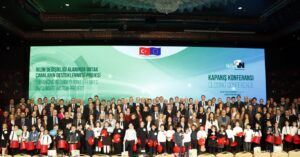
Technical Assistance for Implementation of Civil Society Dialogue and Civil Society Support Programmes (TR2015/DG/01/A5-01/001)
The overall aim of the project is to increase bilateral exchanges and cooperation between CSOs in Turkey and the EU at local, regional and national levels, to promote awareness raising initiatives on importance and benefits of membership of Turkey to the EU within Turkey and EU and on

Technical Assistance for Increased Public Understanding and Enhanced Stakeholder Capacity on the Required Joint Efforts on Climate Action
İklimIN began its implementation with the aim of increasing national and local capacity to prepare medium and long term climate actions towards climate resilient and low carbon development, increasing public understanding to foster joint climate action efforts which will result in gradual alignment with the EU climate policy

Technical Assistance for Promotion of Life Long Learning (LLL)
Experts say that education is a life-long journey, and there is a need to promote the development and implementation of coherent and comprehensive strategies for life-long learning. In this regard, this project aimed to establish an institutional framework and capacity within LLL perspectives in line with EU practices

Training for the Institutional Capacity Building on Climate Change Adaptation
The overall objective of the project is to improve climate change adaptation knowledge and the capacity of the Staff of Turkish institutions (members of CBCCAM (Climate Change and Air Management Coordination Board) for implementation of adaptation policies and projects.

Increasing Competitiveness of Middle Black Sea Region TR83
Turkey’s Middle Black Sea region was set up in 2009 and is now well established; the Middle Black Sea Region Development Agency (OKA) carries out activities to support the economic and social development of Amasya, Çorum, Samsun and Tokat provinces. The main objective of this project was to

Technical Assistance for Promoting Registered Employment
Unregistered employment remains one of the critical concerns and significant challenges of the Turkish labour market. Even though recent years have seen a downward trend in unregistered employment, a substantial portion of Turkey’s workforce is still employed without being registered with the social security system. In this regard,

